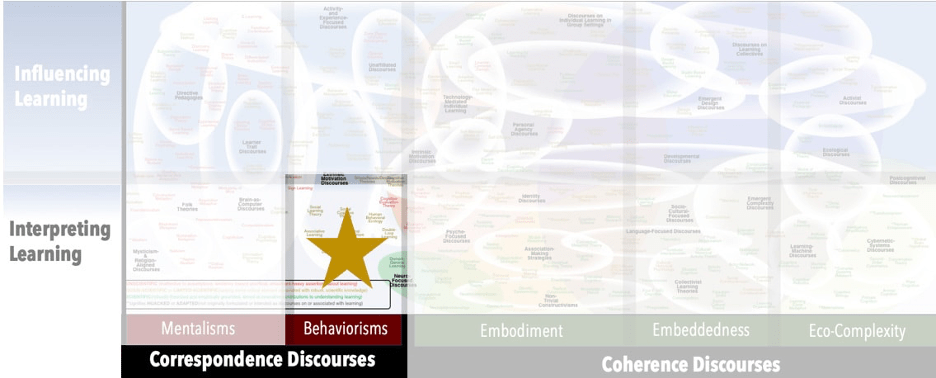Focus
Incorporating mirror neurons into a behaviorist framePrincipal Metaphors
- Knowledge is … repertoire of action
- Knowing is … behaving (triggered by stimuli)
- Learner is … a higher-order organism (with mirror neurons)
- Learning is … changes of action
- Teaching is … conditioning and showing
Originated
2000sSynopsis
Associative Sequence Learning brings research into mirror neurons into the frame of Behaviorisms. Thus, in addition to the mechanisms proposed by Behaviorisms to explain how one learns specific actions, Associative Sequence Learning adds mechanisms associated with Mirror Neurons (under Neuro-Focused Discourses), thus incorporating such acts as simple observation, imitation, and imagined mimicking. Similar discourses include:- Hebbian Learning Account of Mirror Neurons (Christian Keysers, David Perrett, 2000s) – a blend of Hebbian Learning (under Neuroplasticity) and Associative Learning, in which Mirror Neurons (under Neuro-Focused Discourses) are suggested to develop their their dual properties of responding to both observed and executed actions through repeated, simultaneous activation of sensory and motor pathways during specific experiences
Commentary
Associative Sequence Learning is better construed as an update to Behaviorisms than a new theory, or even a radical innovation to established sensibilities. It is thus subject to the same sorts of criticisms as Behaviorisms, albeit that some of the prominent concerns (e.g., a lack of insight into how humans learn complex sequences of action) are somewhat tempered by the appeal to mirror neurons.Authors and/or Prominent Influences
Cecilia HayesStatus as a Theory of Learning
Associative Sequence Learning is a theory of learning.Status as a Theory of Teaching
As with most Behaviorisms, Associative Sequence Learning offers immediate prescriptions for how to influence learners’ behaviors. Consequently, although explicitly a theory of learning, Associative Sequence Learning can also be construed as a theory of teaching – albeit one with limited value when the diversity of learners, the complexity of contexts, the range of desired competencies, and other defining features of modern schooling are taken into full consideration.Status as a Scientific Theory
Like most Behaviorisms, proponents of Associative Sequence Learning claim a substantial base of empirical evidence. It thus meets some of the criteria of a scientific theory. However, it tends to fall short on matters of critical attentiveness to its central constructs, as is evident in its uncritical alignment with core principles and intentions of most Behaviorisms.Subdiscourses:
- Hebbian Learning Account of Mirror Neurons
Map Location

Please cite this article as:
Davis, B., & Francis, K. (2024). “Associative Sequence Learning” in Discourses on Learning in Education. https://learningdiscourses.com.
⇦ Back to Map
⇦ Back to List
